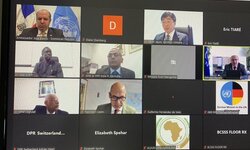Madam President, Members of the Security Council,
The state news agency of the Democratic People’s Republic of Korea (DPRK) reported that the DPRK launched a new type of intercontinental ballistic missile (ICBM) - at approximately 2:34 p.m. local time on 24 March.
The missile – so-called “Hwasong-17” - was reportedly launched from Sunan, an area north of Pyongyang. It covered a range of 1,090 km and reached an apogee of around 6,200 km. It made impact in the sea within Japan’s exclusive economic zone.
The last time the DPRK conducted an ICBM test was on 29 November 2017.
Madam President,
The Secretary-General strongly condemns the DPRK’s latest ICBM launch. This is a flagrant breach of the DPRK’s own 2018 moratorium and a clear violation of relevant Security Council resolutions. This launch risks triggering a significant escalation of tensions in the region and beyond.
The DPRK has conducted twelve launches using ballistic missile technology this year alone. This is the fifth time the Secretariat has been asked to brief the Council in 2022 in this connection.
According to public statements by the DPRK, the launches involved, among other things, a test of so-called hypersonic weapons, railway-borne missiles, an intermediate range ballistic missile and tests of systems related to the development of so-called military reconnaissance satellites.
It should be recalled that the Council, in resolution 2397 (2017), reaffirmed its decisions that the DPRK shall not conduct any further launches using ballistic missile technology.
The DPRK did not issue airspace or maritime safety notifications for any of these launches. The International Civil Aviation Organization (ICAO) has repeatedly informed the DPRK that unannounced missile launches represent a serious risk to international civil aviation.
ICAO has also called on the DPRK to act in accordance with the Convention on International Civil Aviation.
Madam President,
The DPRK also appears to be actively pursuing its nuclear programme. On 7 March, the Director-General of the International Atomic Energy Agency (IAEA) reported that there were quote “ongoing indications consistent with the operation of the 5 megawatt reactor at the Yongbyon site” end quote.
The IAEA added that they continued to observe construction activities at the Yongbyon site, including the construction of an annex to the reported Centrifuge Enrichment Facility.
The same day, satellite imagery analysis indicated that there was renewed activity at the Punggye-ri nuclear test site for the first time since Pyongyang announced its closure and dismantlement in 2018.
In pursuing its nuclear capability and ballistic missile programmes, the DPRK is defying the repeated demands of the Council to cease such activities. We have consistently conveyed these concerns to the DPRK.
Madam President,
The Secretary-General reiterates the importance of addressing humanitarian imperatives in the DPRK.
The United Nations remains engaged and stands ready, along with its humanitarian partners, to assist people in need in the DPRK, whose vulnerability has likely increased since the pandemic outbreak and border closures in 2020.
We reiterate our call for the entry of international staff, including the United Nations Resident Coordinator, and the unimpeded entry of humanitarian supplies, to allow for a timely and effective response.
Madam President,
The Secretary-General reaffirms his commitment to working with all parties for sustainable peace and the complete and verifiable denuclearization of the Korean Peninsula.
He urges the DPRK to comply with the decisions of the Council, reset the course to dialogue and build on previous diplomatic efforts.
Further, the United Nations welcomes the regular contact and cooperation among the key parties on the Korean Peninsula. We commend the parties for their willingness to engage in dialogue with the DPRK without preconditions.
Madam President,
Let me close by reiterating that the unity of the Security Council in this matter is essential to ease tensions, overcome the diplomatic impasse and avoid a negative action-reaction cycle.
Thank you.
















